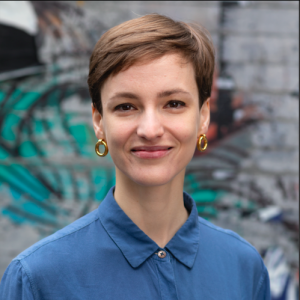Sarina Kuersteiner joined Union in 2022 as an assistant professor of history, specializing in the cultural, economic and legal history of the premodern Mediterranean. The Zurich, Switzerland, native is also one of her country's sport climbing medalists, a distinction she finds delightfully ironic.
"I won the bronze at the national Swiss championship in speed climbing," she said. "What's hilarious is that I was one of only four competitors."
Kuersteiner caught the climbing bug at 17, introduced to the sport by the "cool kids" in the Sinfonietta Zürcher Oberland, where she was a violinist. She has since conquered cliffs and scaled indoor rock walls in Europe, South Africa and the United States. "Bouldering"—short, challenging ascents conducted without the aid of ropes—is her favorite climbing style. On her days off, you can often find her practicing in one of the vertiginous spaces at The Edge climbing gym in Halfmoon.
"I like bouldering best because it is so creative. Each boulder is a new problem that requires new skills. I enjoy figuring it out with others and trying again and again while seeing how, literally in the same session, my body learns how to solve it. My teaching motto is to impart this experience to my students: If you try again and again, you will learn."
Among Kuersteiner's more earthbound pursuits include practicing her violin and listening to all genres of music. Much of her free time is also dedicated to expanding her linguistic repertoire. She is currently studying Arabic, the newest addition to the five other languages she already confidently speaks.
During her Ph.D. studies at Columbia University, Kuersteiner co-founded the Medievalist Toolkit, a public history project. Created in response to nationalist violence in Charlottesville, Va., and elsewhere, the initiative challenges popular misconceptions about medieval history, including iconography and narratives that are often weaponized by extremist groups.
"Our mission is to build bridges between scholarly research on the misuse of the medieval past and people working in social work, journalism and education."
Kuersteiner and her spouse, Andy, a political science professor at Princeton University, split their time between Schenectady and Manhattan. The couple are parents to IPA, a voracious, floppy-eared lapin.
GO-TO BREAKFAST: In the fall, I love getting croissants and scones at the Green Market and strolling back and forth between the stands.
WHAT’S THE LAST GREAT BOOK YOU READ?: “The Evolution of Beauty: How Darwin’s Forgotten Theory of Mate Choice Shapes the Animal World – and Us” by Richard O. Prum. A Ph.D. committee member and important intellectual role model recommended it. Great book.
FAVORITE PLACE TO VISIT: The Rabbit Island in Okunoshima, Japan. What a special place. The island is a rabbit sanctuary with thousands of rabbits who roam freely and live out their lives.
WHAT ARE YOU WATCHING RIGHT NOW?: “Jury Duty,” streaming on Amazon Prime. I absolutely love it.
ONE SKILL YOU WISH YOU HAD: I would like to be able to draw. I am traumatized by my kindergarten teacher who yelled at me for coloring outside the lines of a parrot illustration. I recently did draw my nieces’ favorite animals: penguins and giraffes. They turned out pretty well.
THREE DINNER PARTY GUESTS (living or deceased): Mom, Dad and Andy, my husband.
FIRST CONCERT: My parents dragged me to classical music concerts early on. The first I remember is Baroque guitarist Rolf Lislevand. I have never seen such beautiful hands. Dad also played guitar concerts for us. Those were awesome.
LITTLE KNOWN FACT ABOUT YOU: My favorite childhood game was librarian. I would stack up books on a table and imagine people coming to the library to check them out. I led imaginary conversations about the stories in the books.

